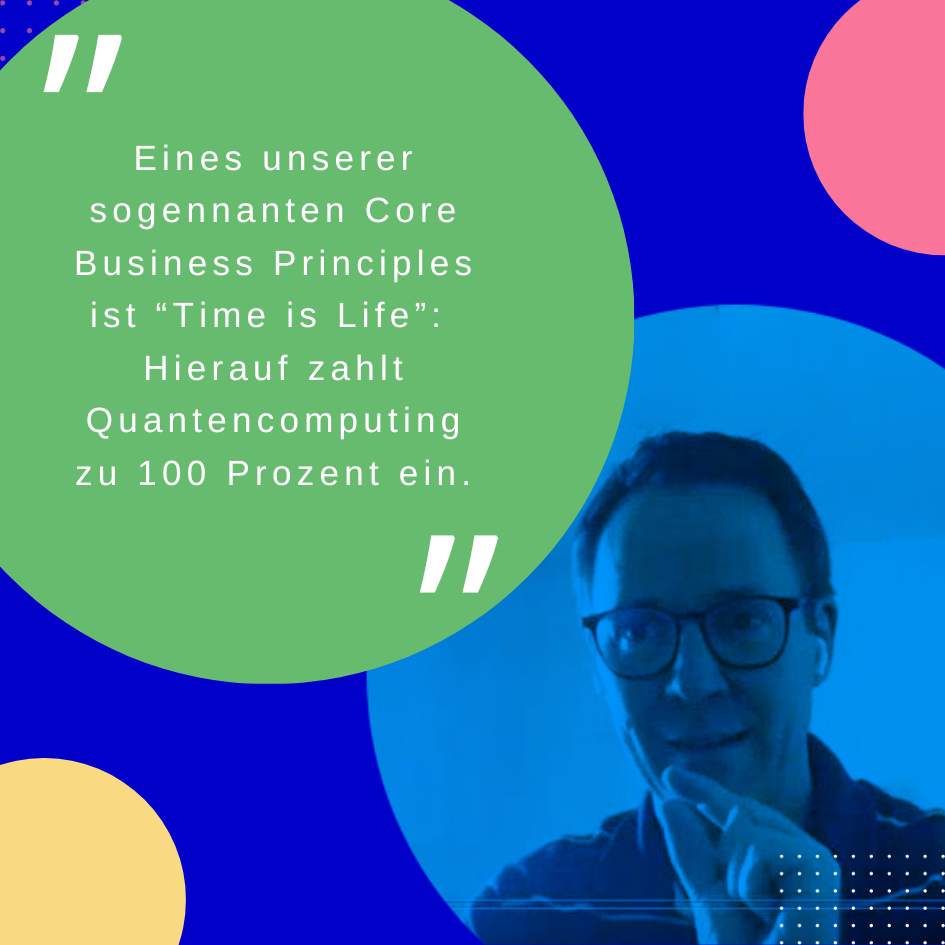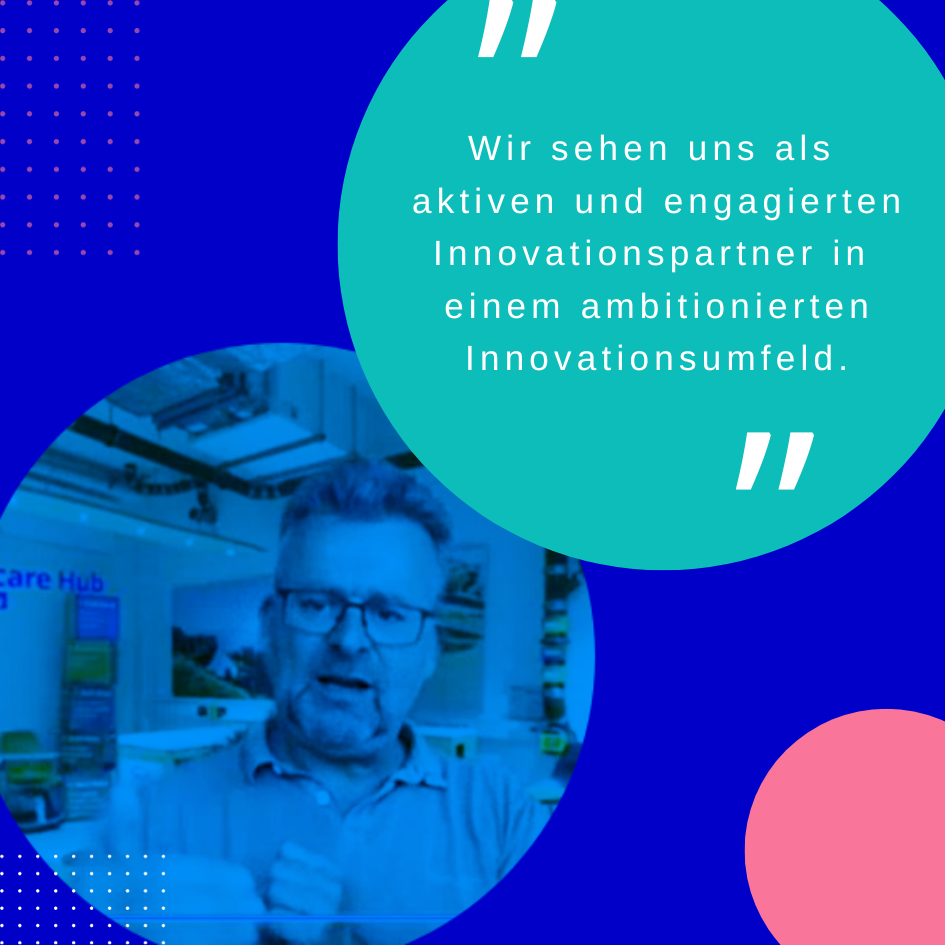Tomorrow's game changer
How the use of quantum computing can revolutionize the healthcare industry

The use of quantum computing creates a potential value creation potential of up to USD 1.3 trillion for the automotive, chemical, financial and life sciences industries by 2035 (1). On the other hand, there is the high complexity of quantum technologies as well as a large talent gap: The demand for qualified experts significantly exceeds the currently available specialists.
So far, however, quantum technology has had only a few quick wins. At the same time, it turns out that the intermediate technology of so-called "Quantum Annealing (2)" has a lot of potential. What opportunities does Pfizer see through the use of these future technologies? What role does Pfizer play as an innovation leader and what role does Germany and Baden-Württemberg in particular play in this context?
We spoke with Thomas Kleine, Country Digital Lead at Pfizer, Peter Neske, Innovation Lead at the Pfizer Healthcare Hub Freiburg and Dr. Hans Zebner, Innovation Engineer, also at the Pfizer Healthcare Hub, about the potential of quantum computing for the healthcare industry and at Pfizer.
What opportunities and potentials does quantum computing offer for the healthcare industry?
Thomas Kleine: "From a pharmaceutical point of view, the greatest potential probably lies in the field of drug research: whether for the development of new hypotheses about diseases, for carrying out causality analyses with regard to side effects or dosage optimization – quantum technology offers completely new approaches for all these areas. But the entire field of IT security and cryptography, for example, will also have to be rethought by quantum computing in a few years, as completely new possibilities will arise, especially in the field of encryption technologies."
What questions and challenges does quantum technology pose from your perspective?
Dr. Hans Zebner: "The questions of quantum technology are extremely mathematical and statistical and at the same time require knowledge of quantum physics. The question is: How can we transform existing algorithms as well as computational methods and models from the classical von Neumann architecture (3) to quantum architecture? A pure mathematician is not necessarily able to transform classical code for qubits. The topic is highly complex and the community that is currently dealing with it is still very small – a strong commitment to the topic is needed at the decision-maker level. Our task as a healthcare hub is to bring Pfizer's specialist departments together with experts in quantum computing software engineering, to moderate requirements and to accompany processes."
Thomas Kleine: "Nowadays, you can't avoid the hype about generative AI. Compared to quantum computing, generative AI is more predestined for quick wins and is also easier to communicate to decision-makers – this carries the risk that quantum computing will lose relevance and, in particular, priority from a company's point of view. However, the technologies are not in competition with each other, but complement each other in the various areas of application. AI is finding application in tasks such as automation, data analysis, and text production, while quantum computing is revolutionizing hardware technology and data and information processing."
Highly complex topic, great potential – but real value creation is not expected until 2030. Why is quantum computing still so relevant for Pfizer at the moment?

Thomas Kleine: "Pfizer's ambition is to be an innovation leader – both in our products and in the technologies we use to research, develop and manufacture our medicines.
One of our so-called Core Business Principles is "Time is Life": Quantum computing contributes 100 percent to this. Mikael Dolsten, Global Head of Pfizer Research & Development, put it pretty much in a nutshell some time ago with his statement "Science will win and digital will help us to win faster". As with new technologies such as generative AI or the metaverse, we want to boldly lead the way and explore new possibilities. We constantly have to strive for innovation in order to fulfill our mission "Breakthroughs that change patients lives."

Peter Neske: "We are more than just a drug manufacturer. We see ourselves as an active and committed innovation partner in an ambitious innovation environment. Above all, we see ourselves as a partner of society, science, business and politics and want to live up to our responsibility here. For example, we support policies such as QuantumBW, an initiative that promotes the transfer of quantum technology research into practical applications. By researching new technologies, we can help policymakers to make better decisions with real-world insights."
What is currently happening at Pfizer in terms of quantum technology?
Thomas Kleine: "Pfizer has a so-called Quantum Computer Exploration Group, a competence team whose goal is to develop Pfizer into a leading company in the field of quantum technology in the coming years. The start of real value creation through quantum computing in the pharmaceutical industry is not expected until 2030 at the earliest. However, according to a BCG study (4), 10 percent of companies that position themselves early will be able to achieve 90 percent of the added value of quantum computing. That's why we're already working on developing a strategy and a detailed roadmap. Talent development is an important aspect where we are already well positioned.Pfizer has key employees with "quantum skills" across the organization, including quantum chemists, physicists, materials scientists, computer scientists, and quantum scientists.
Establishing key partnerships with partners from industry and academia also plays an important role. Here, too, we can benefit from existing connections. With IBM, we have brought in a partner with a high level of quantum computing expertise for the first phase. Defining and prioritizing use cases as well as finding possible sources of funding are also tasks of the first phase."
Keyword location: What role do Germany and Baden-Württemberg (BW) play in the field of quantum computing?
Peter Neske: "In BW, we are operating in an innovation region that is a leader in the whole of Europe. State policy consistently relies on quantum computing, especially in the fields of health, mobility and climate protection. There is confidence that BW will become the region with the most different quantum computers in the world. In this context, the QuantumBW initiative was also launched, under this umbrella brand global players from business, universities and research institutions have joined forces – Pfizer Germany is also part of this network.
The political agenda at the federal level is also geared towards ensuring that Germany is at the forefront in the field of quantum computing, quantum technology, quantum sensing and quantum networks. Pfizer Germany and the Healthcare Hub want to be an active synapse here. We are ready to network the aspects and questions with each other and to advance quantum computing – for the purpose of the company, but also beyond."
Thank you for the interview!
- McKinsey Quantum Technology Monitor 2023: McKinsey Quantum Technology Monitor 2023 | McKinsey & Company
- Quantum annealing enables optimization tasks to be accomplished with a significant increase in parameter count and speed, resulting in a more efficient solution to complex challenges. As an intermediate technology, quantum annealing helps to further exploit the power of quantum computing in the future and can serve as a bridge to realize rapid successes and functional use cases using quantum technology. This approach shows its strengths especially in applications such as job shop scheduling and logistics.
- The Von Neumann architecture is a reference model for computers in which a common memory contains program commands and data. Since the 1940s, von Neumann architecture has been the dominant design principle for computers.
- Quantum Computing Is Becoming Business Ready 2023: Preparing Businesses to Implement Quantum Computing | BCG